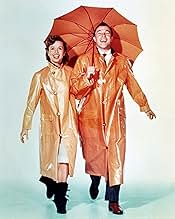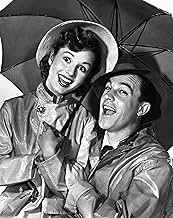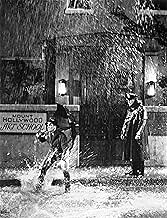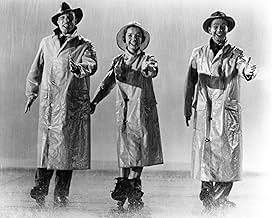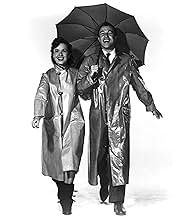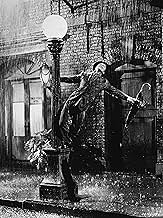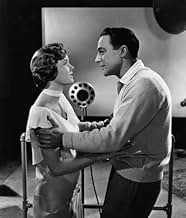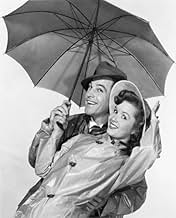Uma produtora de cinema mudo e seu elenco enfrentam uma transição difícil para o cinema falado.Uma produtora de cinema mudo e seu elenco enfrentam uma transição difícil para o cinema falado.Uma produtora de cinema mudo e seu elenco enfrentam uma transição difícil para o cinema falado.
- Indicado a 2 Oscars
- 8 vitórias e 9 indicações no total
Dawn Addams
- Teresa - a Lady-in-Waiting
- (não creditado)
John Albright
- Call Boy
- (não creditado)
Shirlee Allard
- Chorus Girl
- (não creditado)
Bebe Allen
- Chorus Girl
- (não creditado)
Sue Allen
- Chorus Girl
- (não creditado)
John Angelo
- Dancer
- (não creditado)
Marie Ardell
- Chorus Girl
- (não creditado)
Bette Arlen
- 'Miss January' in 'Beautiful Girl' segment
- (não creditado)
David Bair
- Chorus Boy
- (não creditado)
Jane Bateman
- Chorus Girl
- (não creditado)
- Direção
- Roteiristas
- Elenco e equipe completos
- Produção, bilheteria e muito mais no IMDbPro
Enredo
Você sabia?
- CuriosidadesFor the "Make 'em Laugh" number, Donald O'Connor revived a trick he had done as a young dancer: running up a wall and completing a somersault. The number was so physically taxing that O'Connor ended up in a hospital bed for a week after its completion. He suffered from exhaustion and carpet burns. After an accident ruined all of the initial footage, O'Connor agreed to do the difficult number all over again.
- Erros de gravaçãoDuring the Cyd Charisse nightclub dance number, when she's wrapped around Gene Kelly, her body completely changes position between frames due to a clumsy edit. According to commentary on the special edition DVD, this cut of only a few frames' duration dates back to the original release of the film and no one knows why it exists.
- Citações
Cosmo Brown: Lina. She can't act, she can't sing, she can't dance. A triple threat.
- ConexõesEdited from Os Três Mosqueteiros (1948)
- Trilhas sonorasFit as a Fiddle
(1932)
Music by Al Hoffman (uncredited) and Al Goodhart (uncredited)
Lyrics by Arthur Freed
Originally from the 1932 stage revue "George White's Music Hall Varieties"
Sung by Gene Kelly (uncredited) and Donald O'Connor (uncredited)
Avaliação em destaque
I don't like musicals. They never made any sense to me. Don't get me wrong, I love music; it's an important part of my life. I love movies also, and while the two often compliment each other, sometimes I'm repelled. It's probably the dancing. A person breaking into a complicated dance number, seemingly unaware of their surroundings, or worse yet, in complete synch with a complete stranger is like making fun of the movie, as if to say, "Please don't take us seriously, we like to sing and dance." Or even more ridiculous, "Let's not fight, let's settle this dispute with a song and dance." Forget about suspension of disbelief.
This film however, I manage to enjoy. I once was given the task of my film teacher to watch the film and keep track of all the cuts in the film. Well, sometime after ten minutes I lost track because I was so wrapped up in the story. It really is an interesting period in the history of cinema, told well, and with well placed song and dance numbers that at times drag on, but that seems to be more of an excuse to show off the technicolour than anything else. They build you up to it slowly. The first few numbers don't break out at an inappropriate time. It doesn't last though, but by then they've got you.
With such memorable tunes as these, it's hard to imagine them going wrong. When Gene Kelly sings the title piece, somehow time stands still as you're swept up in one of the most memorable scenes in film history. Just reading the title in print has likely caused you to hum a few bars, or sing a few words. Or maybe, just maybe, walk out without an umbrella when you know it's raining. One thing's for sure, if all Gene Kelly did was choreograph the dance numbers, he more than deserves the co-directing credit he has.
They simply don't make films like this anymore. Which in some ways is a testament to the film's theme and narrative. The business of show is constantly in a state of evolution. The narrative portrays a time period when silent films were being replaced by "talkies" with sound, yet the musical genre itself has almost all but disappeared with the exception of animated films with musical numbers, and rare live-action pieces.
One might speculate that Hollywood overdid the musical. Personally, I can't get into them. Most of the time it seems like a drawn out affair, but this film is something special. Considering my feelings about musicals, it would have to take a film of this one's caliber to make me sit up and take notice.
This film however, I manage to enjoy. I once was given the task of my film teacher to watch the film and keep track of all the cuts in the film. Well, sometime after ten minutes I lost track because I was so wrapped up in the story. It really is an interesting period in the history of cinema, told well, and with well placed song and dance numbers that at times drag on, but that seems to be more of an excuse to show off the technicolour than anything else. They build you up to it slowly. The first few numbers don't break out at an inappropriate time. It doesn't last though, but by then they've got you.
With such memorable tunes as these, it's hard to imagine them going wrong. When Gene Kelly sings the title piece, somehow time stands still as you're swept up in one of the most memorable scenes in film history. Just reading the title in print has likely caused you to hum a few bars, or sing a few words. Or maybe, just maybe, walk out without an umbrella when you know it's raining. One thing's for sure, if all Gene Kelly did was choreograph the dance numbers, he more than deserves the co-directing credit he has.
They simply don't make films like this anymore. Which in some ways is a testament to the film's theme and narrative. The business of show is constantly in a state of evolution. The narrative portrays a time period when silent films were being replaced by "talkies" with sound, yet the musical genre itself has almost all but disappeared with the exception of animated films with musical numbers, and rare live-action pieces.
One might speculate that Hollywood overdid the musical. Personally, I can't get into them. Most of the time it seems like a drawn out affair, but this film is something special. Considering my feelings about musicals, it would have to take a film of this one's caliber to make me sit up and take notice.
- ToldYaSo
- 23 de mai. de 1999
- Link permanente
Principais escolhas
Faça login para avaliar e ver a lista de recomendações personalizadas
Detalhes
- Data de lançamento
- País de origem
- Idioma
- Também conhecido como
- Cantando bajo la lluvia
- Locações de filme
- Metro-Goldwyn-Mayer Studios - 10202 W. Washington Blvd., Culver City, Califórnia, EUA(New York City Streets)
- Empresa de produção
- Consulte mais créditos da empresa na IMDbPro
Bilheteria
- Orçamento
- US$ 2.540.800 (estimativa)
- Faturamento bruto nos EUA e Canadá
- US$ 1.884.537
- Fim de semana de estreia nos EUA e Canadá
- US$ 13.643
- 10 de nov. de 2002
- Faturamento bruto mundial
- US$ 2.093.659
- Tempo de duração1 hora 43 minutos
- Cor
- Mixagem de som
- Proporção
- 1.37 : 1
Contribua para esta página
Sugerir uma alteração ou adicionar conteúdo ausente

Principal brecha
By what name was Cantando na Chuva (1952) officially released in India in Hindi?
Responda






